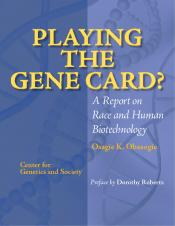Race, Genetics, Society
CGS Advisory Board member Dorothy Roberts on race and intelligence in genetic research
Important research that casts doubt on many uses of racial categories in genetic research is discussed in a recent article co-authored by CGS Advisory Board member Dorothy Roberts and published in Science.
Taking race out of human genetics, Michael Yudell, Dorothy Roberts, Rob DeSalle & Sarah Tishkoff, Science (Feb. 5, 2016), http://science.sciencemag.org/content/351/6273/564.full. Illustration by Davide Bonazzi.
The perspective piece begins by citing to scientists and historians who undermined the scientific validity of the concept of biological race—including W. E. B. DuBois some 100 years ago. While the Human Genome Project found that humanity was 99.9% genetically the same, the authors note an uptick since 2000 in the use of race in genetics research as a data stratification factor. To avoid confusion, they helpfully define two separate but often conflated concepts: ancestry (“a very personal understanding of one’s genomic heritage” based on individual lineage) and race (“a pattern-based concept” used to “draw conclusions about hierarchical organizations of humans”).
They put forth two recommendations:
- “Scientific journals and professional societies should encourage use of terms like ancestry and population to describe human groupings in genetic studies … Historical racial categories that are treated as natural and infused with notions of superiority and inferiority have no place in biology.”
- “The U.S. National Academies of Sciences, Engineering, and Medicine should convene a panel of experts… to recommend ways for research into human biological diversity to move past the use of race as a tool for classification in both laboratory and clinical research.”
In an interview on NPR, Dorothy Roberts noted:
As a social scientist, looking at biologists treating these groupings as if they were determined by innate genetic distinctions, I'm dumbfounded. There's so much evidence that they're invented social categories … It in many cases leads researchers down the wrong path and leads to harmful results for patients. … It's not only that there's scientific evidence that humans aren't divided into discrete biological categories we'd call races. But there's also evidence of the harm these biological meanings of race have caused for centuries.
|
Dorothy Roberts breaks down the widespread use of race to make false biological predictions in her new TedMed Talk, where she highlights problematic ongoing diagnostic practices, including some developed during the American era of—and in justification of—slavery. In related news, Dorothy Roberts was cited in the National Geographic story, Are There Genes for Intelligence—And Is It Racist to Ask? regarding her work as a Fellow at The Hastings Center and their recent Report on the ethics of genetic intelligence research. Journalist Robin Marantz Henig paraphrases Roberts as saying that |
 |
any research that bolsters the hereditary concept of intelligence could actually hurt the disadvantaged, since it almost inevitably would be used to support ‘racist, classist, gendered notions of intelligence.’ The bottom line, to Roberts, is that studying the genetics of intelligence ‘cannot possibly be socially neutral—and in fact will intensify social inequities.’
For more on this and related points, see Roberts’ Can Research on the Genetics of Intelligence Be “Socially Neutral”? in The Hastings Center Report.
ACLS Public Fellow: CGS Project Director on Race, Genetics & Society
 |
As we announced back in January, recent PhDs can apply to the American Council of Learned Societies (ACLS) Public Fellows Competition for a shot at joining CGS for a two-year position as Project Director on Race, Genetics & Society. We are eagerly looking forward to bringing a new colleague on board to grow our organizational work and capacity on the social justice implications of leveraging race in genetics research. You can find more information about the application process on the ACLS website, and learn more details about the position via this PDF. The application deadline is March 24, 2016 |
CGS Resources on Race & Genetics
|
As a part of our communications program, we collect news and commentary on racial justice issues in human genetic and reproductive technologies. Here’s a sampling of some recent resources that you can find on the CGS website. Recently in the news:
|
|
Over the years, our staffers and fellows have produced a range of commentary on the intersection of race and genetic research. Key reports include Playing the Gene Card? : A Report on Race and Human Biotechnology by CGS Senior Fellow Osagie K. Obasogie, and a joint report we published with the Center for American Progress Geneticizing Disease: Implications for Racial Health Disparities[PDF] by Jamie D. Brooks and Meredith L. King. Recent episodes of our online conversation series Talking Biopolitics have also delved into issues of race in genetics, including: |
 |
Images courtesy of Elliot Hosman/CGS and ACLS




